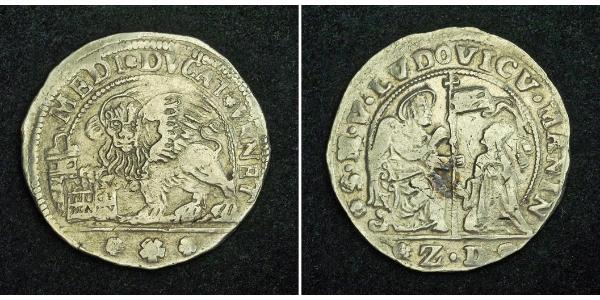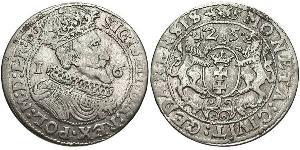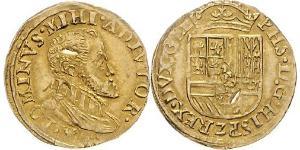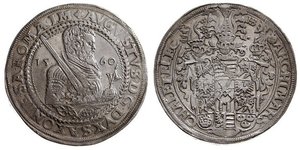(sold for $187.0)
1761, Doges of Venice, Ludovico Manin. Silver ½ Ducato Nuovo Coin. R!
Mint Period: 1762-1763
Denomination: ½ Silver Ducato (Mezzo Ducato Nuovo)
Assayer: Zuanne Diedo (Z.D., active during 1762-1763)
Condition: Crudely struck (as usual), otherwise about XF!
Doge: Pietro Grimani (as 115th Doge of Venice, 1741-1752)
Reference: CNI 43, P. 48, KM-C#39 ($300 in VF / $600 in XF). Rare!
Weight: 11.04gm
Diameter: 34mm
Material: Silver
Obverse: Lion of St. Mark left, with right paw on book of gospels beneath castle tower.
Legend: MEDI * DVCAT * VENET
Exergue: ***
Reverse: Doge kneeling before nimbate St. Mark seated on throne and receiving docal banner with two long terminals.
Legend: * S . M . V . LVDOVICV . MANIN
Exergue: * Z * D *
Ludovico Manin (14 May 1725 – 24 October 1802) was the last Doge of Venice. He governed Venice from 9 March 1789 until 1797, when he was forced to abdicate by Napoleon Bonaparte.
Lodovico Manin was the eldest of five sons of Lodovico III Alvise (1695–1775) and Lucrezia Maria Basadonna, the great-granddaughter of cardinal Basadonna from Treviso. He attended the University of Bologna and was a boarder at the College of St. Xavier noble: there he printed some propositions of natural law, which he incurred in this period. When he began public life, was quickly noticed for his generosity, his honesty, his kindness and above all his wealth. He married Elisabetta Grimani (d 1792) on 14 September 1748.
At twenty-six he was elected captain of Vicenza, then to Verona where he had to cope with the flood of 1757, finally Brescia. In 1764 he was appointed procurator of San Marco de ultra. Fond of religious meditations in 1769 he asked and obtained permission to not hold an office because of ill health and bad hearing. In 1787 he was chosen to honor Pope Pius VI as he crossed the possessions of Venice and the Pope rewarded him knighted and awarded a number of spiritual privileges.
Lodovico married Elizabeth Grimani, who bore him a dowry of 45,000 ducats. Elizabeth had been educated in a monastery in Treviso and was in poor health since childhood. She gave him no children. As the eldest he owned Villa Manin di Passariano, that was inherited by his nephew, Lodovico Leonardo I (1771–1853) the son of his brother Giovanni (1736–1774) and Caterina (Pesaro), the heiress of a wealthy noble Israelite family who claimed to come from Cyrus the Great.
Lodovico was elected Doge of Venice on 9 March 1789, approximately one month before the start of the French Revolution, on the first ballot (the electoral assembly was composed of 41 members). His traditional coronation ceremony required him to throw coins to the Venetians, which cost more than 458,197 Lira, less than a quarter of which was paid from the funds of the Republic of Venice, the rest coming out of his own pocket. By the year 1792, he had allowed the once great Venetian merchant fleet to decline to a mere 309 merchantmen.
When Napoleon invaded Italy, Venice, along with Genoa, did not initially join the coalition of Italian states formed in 1795, instead maintaining neutrality. On 15 April 1797, Jean-Andoche Junot gave the Doge an ultimatum which was not accepted. A secret addition to the Treaty of Leoben, signed on 17 April 1797, gave Venice—as well as Istria and Dalmatia— to Austria. On 25 April 1797, the French fleet arrived at the Lido. Venetian cannons sank one of the ships, but did not succeed in repelling the invasion since the Venetian war fleet numbered only 4 galleys and 7 galliots. The Doge surrendered on 12 May 1797 and left the Doge's Palace two days later.
On 16 May French troops entered Piazza San Marco and the surrender contract was officially signed, submitting Venice to French rule.
After his abdication Lodovico Manin refused an offer to become the interim head of the municipality and withdrew from society, living in near seclusion in the Palazzo Dolfin Manin, reportedly refusing even to answer his door to friends. He returned the ducal insignia (principally the distinctive ducal crown known as the corno ducale) alongside the "golden book" that served as a register of the oligarchical families of the republic to the Piazza San Marco where they were hidden by the new city authorities.
Due to health reasons he was forced to walk a lot and on these occasions was sometimes made the object of insults from former citizens who lamented Venice's changed fortunes and were angered by his decision to avoid bloodshed by surrendering the freedom of the ancient republic to the French. He wanted to end his days in a monastery but this proved impossible.
He died in his house of dropsy and heart problems on 24 October 1802. His will ordered that his funeral should take place "with the least possible pomp". He left 110,000 ducats to the Manin Foundation for the benefit of the cities lunatics, orphans, and girls from poor families needing a dowry. His remains were interred in the chapel of the Church of the Scalzi in Venice near the present railway station of Venice Saint Lucia in the family tomb of Manin where his late wife already lay. The tomb slab survives and bears the simple inscription Manini Cineres ("ashes of Manin").
Only 1$ shipping for each additional item purchased!

|
Posted by:
anonymous 2014-04-14 |
1 Bu Japan Gold
group has 2 coins / 1 prices
⇑























